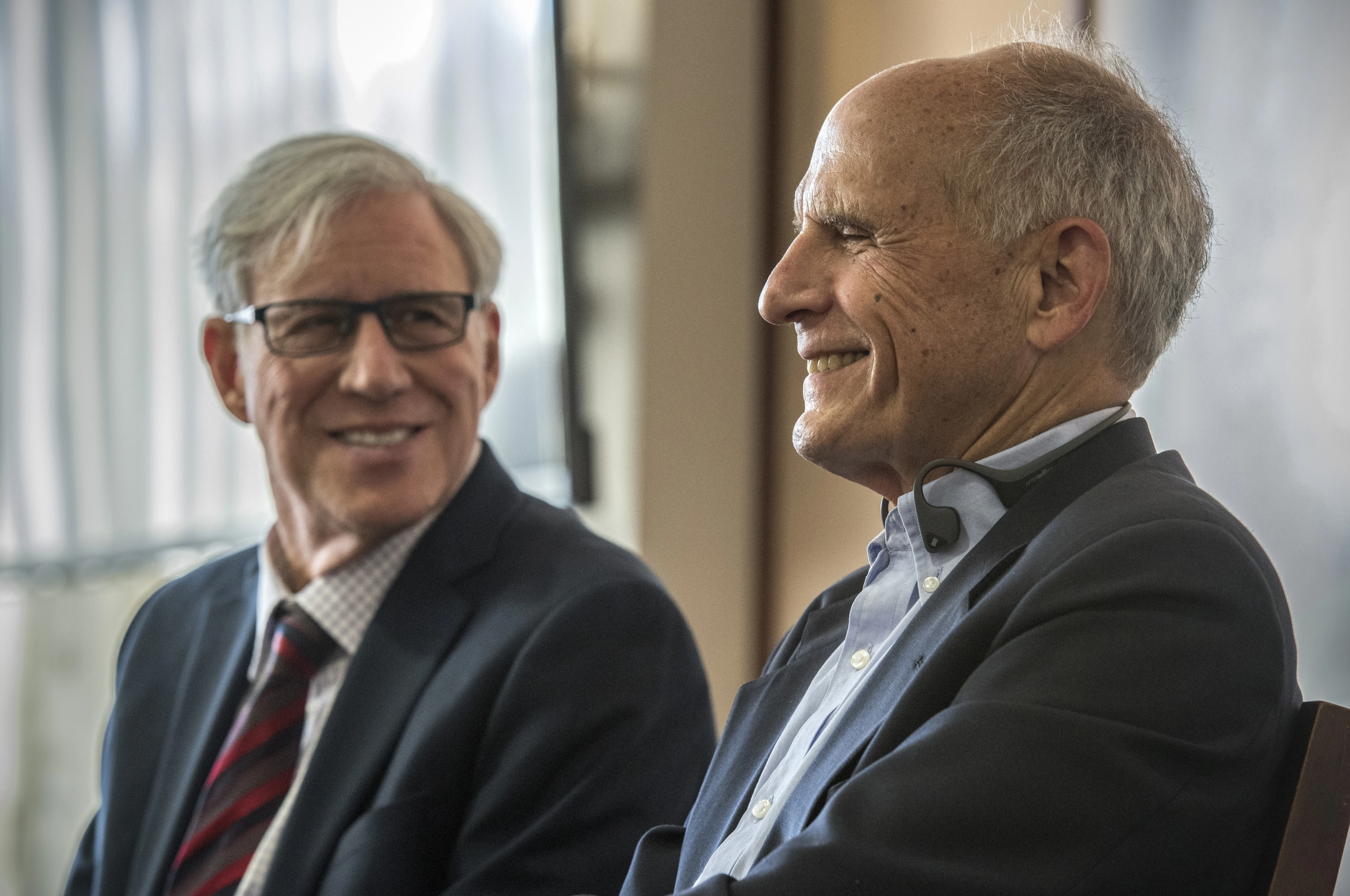A Student of Adversity

If adversity is a teacher, then federal Judge David S. Tatel, ’66, has been a lifelong student.
Tatel, who sits on the United States Court of Appeals for the District of Columbia Circuit, spoke frankly about his nearly 60-year legal career to a packed room of University of Chicago Law School students and faculty as part of a Q&A with Professor Geoffrey R. Stone at the first Edward H. Levi Distinguished Visiting Jurist lecture of the 2022-2023 academic year.
While much of Judge Tatel’s expertise as an attorney, presidential appointee, and member of the federal judiciary has been formed by the countless legal briefs and cases he’s studied, the judge credits a great deal of his knowledge to his encounters with people from all walks of life throughout his career, beginning with his time as a student.
“My time at the Law School was formative because of the exposure I had to professors and the conversations shared with classmates,” said Tatel during the conversation with Stone, the Edward H. Levi Distinguished Service Professor of Law.
From the beginning, Tatel was attuned to adversity and the legal system’s response to it. He said that attending the Law School during the height of the civil rights movement guided many of his views on justice and integrity in the law. It was then that he became keenly aware of how critical judges were to the advancement of civil rights around the nation.
“I admired the extraordinary role that judges were playing during the height of the civil rights movement, particularly in the South,” Tatel told the audience, adding, “but I never thought of becoming one myself.”
Though he had not planned the path he ultimately took, Tatel always intended on channeling his passion for justice and equality into every aspect of his legal career. Following graduation, he worked for several years as an associate at the law firm now called Sidley Austin, LLP, before becoming the inaugural director of Chicago’s office of the Lawyers’ Committee for Civil Rights Under Law. Established in 1963 at the behest of President John F. Kennedy, the organization aims to “secure equal justice for all through the rule of law, targeting in particular the inequities confronting African Americans and other racial and ethnic minorities.”
He later moved to Washington, DC, as the organization’s national director, a role that enabled him to build relationships with members of the private bar as well as government attorneys who also sought to apply their skills and talents to confront injustice.
There “I developed mentors and role models … many of which made it possible for me to have been considered a federal judge,” he said.
In 1994, after Ruth Bader Ginsburg was appointed to the US Supreme Court, President Bill Clinton nominated Tatel to replace her on the United States Court of Appeals for the District of Columbia Circuit. For the past 28 years, Tatel has heard some of the nation’s most important and contentious cases — including many that made their way to the highest court in the land.
“I believe you all should feel fortunate about the experiences and lessons that you’re learning while at the University of Chicago Law School.”
Judge David Tatel, '66
Tatel’s role as a lifelong student shined midway through his talk when Stone asked him to describe his decision-making process on statutory and constitutional law issues. His response was simple:
“When you have a question of statutory interpretation, don’t start with other circuit interpretations, start with the statute,” he said, “and when you’re dealing with a constitutional matter, start with the language in the Constitution.”
This very “UChicago” answer resonated with Sophia Houdaigui, ’24. She was inspired by how the “judge’s time at The Law School can be felt in how he handles even the most pressing issues that comes before him in chambers, like the controversial voting rights case, Shelby County v. Holder (D.C. Cir. 2012).”
Tatel, who wrote the circuit court opinion for Shelby County upholding the constitutionality of Section V of the Voting Rights Act of 1965, expressed concern with the process by which the Supreme Court ultimately struck down the provision.
Stone also asked Tatel how his blindness, which is caused by retinitis pigmentosa, impacted his career. With his seeing eye dog, Vixen, by his side, Tatel broke into an introspective laugh. He said he struggled with the degenerative eye disorder as a law student but that it did not impact his work. But even as it worsened in the years that followed, he said he doesn’t believe it has altered his judgement or legal philosophy.
“I think my views on civil rights came from growing up in the 1960s, not from my own disability,” he said.
He added that his own experience with a disability merely serves as a reminder of the struggles that others face when dealing with discrimination on the basis of disability, race, gender, and other imputable traits.
In May 2022, Tatel took Senior Status on the Court, but his pursuit for truth and knowledge has continued in this role in the same way it did during his first days at the Law School over five decades ago. In closing, Tatel urged students to heed the same call to action that he once answered — to embrace the lessons learned over the next three years and to apply them throughout the arc of their legal careers.
“I just want to reiterate how indebted I am to the Law School,” he said. “I believe you all should feel fortunate about the experiences and lessons that you’re learning while at the University of Chicago Law School.”
